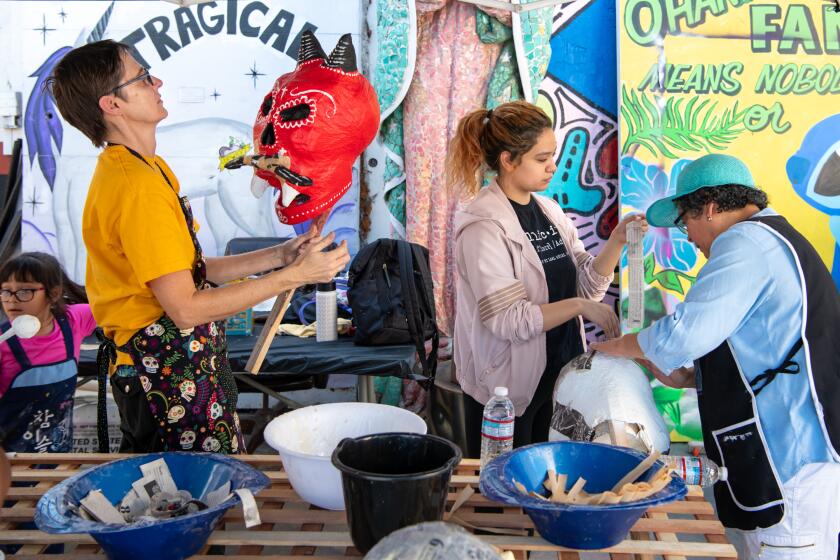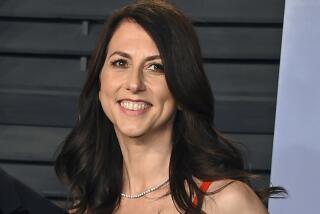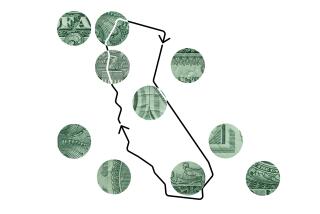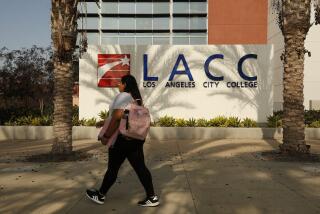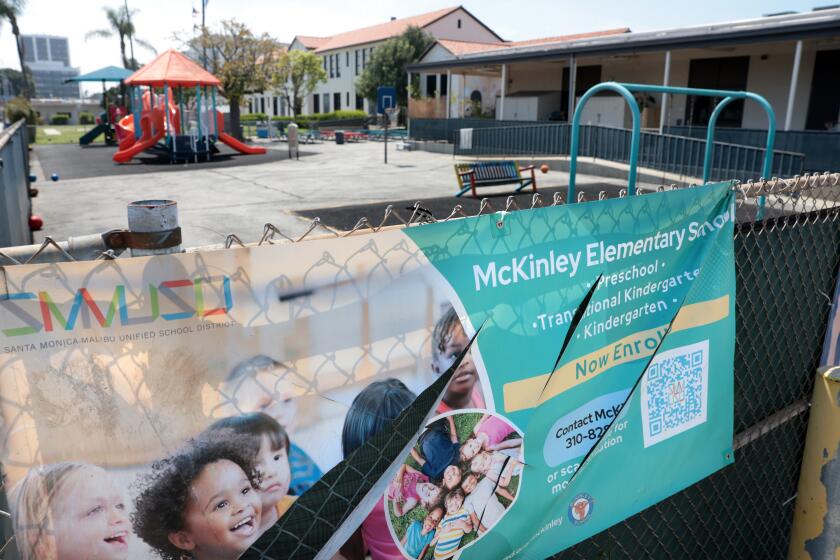It wasn’t a crank call: Surprising many, MacKenzie Scott gives millions to California groups
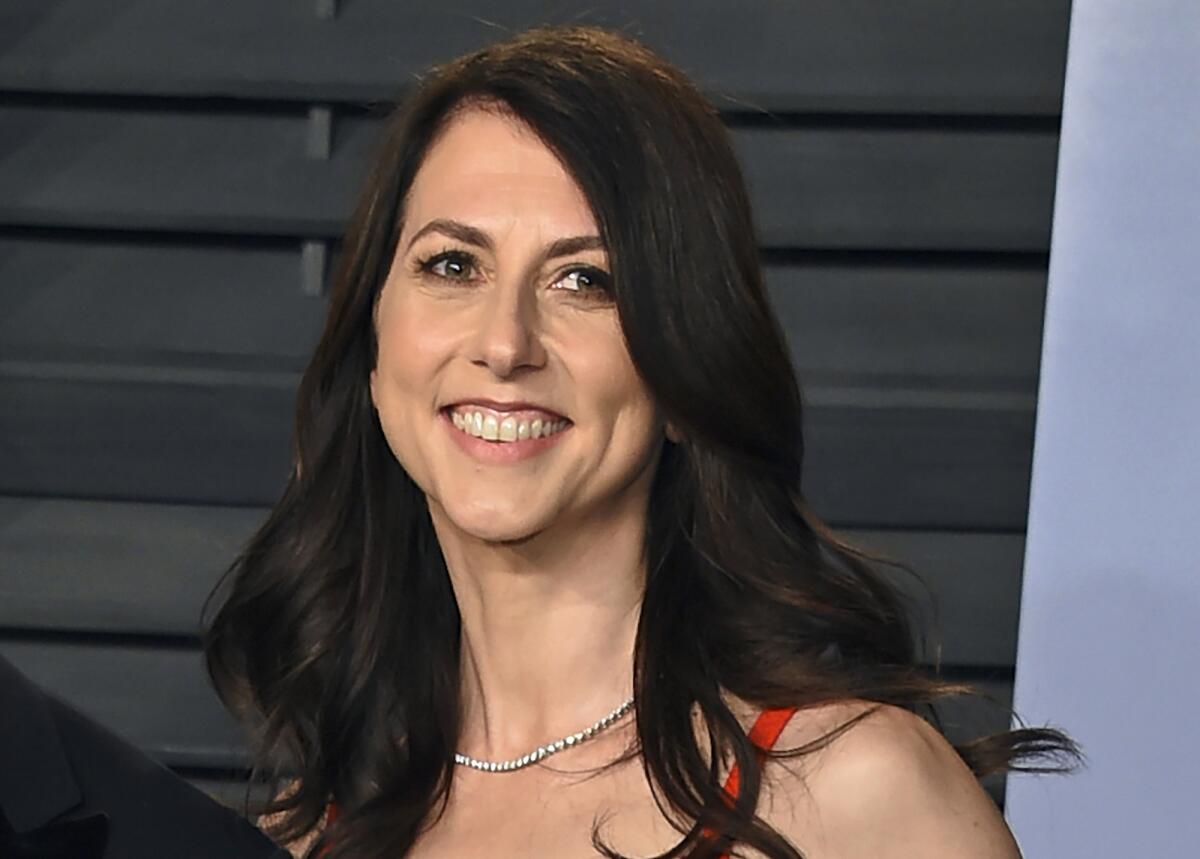
Denise Dunning opened an email in spring that said an anonymous donor wanted to make a donation to Rise Up, a California-based nonprofit she leads that works to improve the rights of women and girls across the globe. She thought it was spam. It wasn’t — and a multimillion donation is headed her way.
Long Beach City College leader Mike Muñoz frantically Googled anything he could to see if the person on the phone offering a big donation was a crank caller. The offer was real — and the college will receive $30 million, its largest-ever single donation.
At the Japanese American National Museum in Little Tokyo, President Ann Burroughs was so stunned by the offer of an unrestricted gift of $10 million that it took several days before she believed it.
In that unconventional way, MacKenzie Scott — billionaire philanthropist who is divorced from Amazon.com chief executive Jeff Bezos — announced Tuesday that she and her husband, Dan Jewett, were giving $2.7 billion to 286 organizations, bringing her total donations since July 2020 to $8.5 billion. More than three dozen of the recipients in Scott’s latest round of giving are California community colleges and universities, arts organizations and nonprofits that work for social justice.
The donations bear the earmarks of Scott’s rare and signature style. One of the world’s richest women gives with no strings attached, empowering groups to spend the money where they see the biggest need. In her blog post Tuesday on medium.com, Scott said she wanted to deemphasize “privileged voices” and a focus on the wealthy donor and cede the spotlight to the groups in the trenches doing the work.
“People struggling against inequities deserve center stage in stories about change they are creating,” she wrote.
MacKenzie Scott, the billionaire philanthropist and Jeff Bezos’ ex-wife, gives $2.7 billion to a variety of charities — $8.5 billion since July 2020.
Scott, 51, said she and her team looked for “equity-oriented non-profit teams working in areas that have been neglected” — campuses that serve disadvantaged students, organizations that bridge deepening ethnic and religious divides, arts and cultural institutions that strengthen communities by fostering empathy, economic mobility and improved mental health.
In California, the recipients include UC Merced, California State University campuses at Pomona, Fullerton, Northridge and Channel Islands as well as California Community Colleges in Long Beach, Pasadena and Santa Barbara. Other recipients include Homeboy Industries, which helps rehabilitate formerly incarcerated people or those involved with gangs; Faith in Action, a national organizing network against hate and racism; and the L.A. Arts Endowment Fund.
Stacy Palmer, editor of the Chronicle of Philanthropy, said Scott favors smaller organizations that rarely get noticed by big donors and seeks to fund organizations headed by those they serve, including women and people of color. The effect has been a transformational model of giving that most nonprofits hope other donors follow, she said.
“It’s extraordinary and very different than other billionaires, who tend to give to well-known institutions,” Palmer said. “It’s just so striking that one of the world’s wealthiest women is giving to all of these groups that typically never hear from a millionaire, much less a billionaire.”
She added, however, that some have criticized Scott’s lack of transparency in how she chooses and vets her gift recipients. Unlike most foundations, Scott does not have an application process but the calls to develop one and operate more openly are “very high,” Palmer said.
Not that the recipients are complaining. In statement after statement, many of them echoed the same refrain: This is their largest-ever donation that will allow them to make major leaps in advancing their work.
“I don’t think I even could speak when I first got the news,” Dunning said of the record-breaking donation. “What I appreciate about their approach in this work is how they really believe in the leaders and the organizations they’re choosing to support. It’s a large gift with very few restrictions so we can really focus our time, energy and money on doing the work that we need to do.”
“These are not the organizations that have privilege, or generations of wealth behind them,” said Burroughs, president and chief executive of the Japanese American museum. “What I found really encouraging was the number of [Asian and Pacific Islander] organizations on that list. Traditionally, API organizations get less than 1% of philanthropic funding.”
The billionaire philanthropist donated $2.7 billion to 286 arts, educational and social justice organizations. Here are some of the SoCal recipients.
The museum, Burroughs said, received a “game changing” $10-million donation — a gift that she said will help fund plans to “reimagine” its main exhibit.
The donations are also a boon to public universities and colleges struggling with enormous financial losses triggered by the pandemic; at least $285 million of Scott’s donation went to 12 community colleges and universities in California.
UC Merced received $20 million; Pasadena and Long Beach City Colleges each received $30 million; Santa Barbara City College, $20 million; Chaffey College, $25 million; Cal State Northridge, Cal Poly Pomona and Cal State Fullerton each received $40 million; Cal State Channel Islands, $15 million; Porterville College, $7 million; College of the Desert, $18 million; and West Hills College Lemoore also received a donation.
At Long Beach City College, Muñoz said plans for the funds are still being hashed out but will focus on addressing racial equity gaps and improving support for the college’s most vulnerable students, including formerly incarcerated students, “Dreamers,” foster youth and those struggling with access to food and housing.
The college, which serves a student body comprising 54% Latino students and 14% Black students, has worked to improve equity and address structural racism for years, especially ramping up efforts in the aftermath of George Floyd’s murder.
“I think a gift like this is really validating,” said Muñoz, interim superintendent-president. “When you think of the faculty and staff that have been doing equity work on our campus for decades, sometimes they feel invisible.”
Cal Poly Pomona plans to invest in an endowment fund and programs to help students graduate and eliminate equity gaps on campus, said Daniel Montplaisir, vice president for university advancement. About half of Pomona’s nearly 28,000 students are Latino and the first in their families to attend college.
UC Merced Chancellor Juan Sánchez Muñoz has a long list of ideas for how to spend what he called an “astounding” $20-million gift: faculty research support, academic enrichment programs, student services, community engagement, curriculum innovation. He also said the money could lay a cornerstone for potentially the first-ever fundraising campaign at Merced, the smallest and youngest of the University of California’s nine undergraduate campuses, where more than 60% of students are underrepresented minorities, low income and the first in their families to attend college.
“It really gives us a tremendous catalyst opportunity emerging from the pandemic ... that will allow us to assist our faculty, staff and students,” he said.
Chaffey College in Rancho Cucamonga serves nearly 23,000, with Latino students accounting for roughly 86% of the student body — many who are first-generation college students.
“Chaffey College plans to use the gift to support students who are the first in their families to go to college, students of color and those from low socioeconomic backgrounds. Funding will also support basic needs programs,” the college said.
Scott’s donation to Faith in Action will allow the organization to strengthen its national network, which currently spans 125 cities. Advancing its work on immigration and racial and economic justice would be its “North Star” in deciding where to allocate the funds, the Rev. Alvin Herring said.
“California is a microcosm for the entire country,” he said. “Immigration is a critical issue and we’ve been working hard to fight back against the efforts of making it hard for people to vote. We will make a greater impact because of gifts like this.”
Palmer, the Chronicle of Philanthropy editor, noted that her publication’s reporting on Scott’s gifts has found that her model of giving to networks that then share the funds with its members has a powerful multiplier effect.
Homeboy Industries, which served 9,000 people last year, will use the $20-million gift to develop more housing for program participants, create quality jobs and establish an operating reserve.
“We are incredibly honored and humbled to receive this extraordinary gift from a game-changing philanthropist committed to the notion that there is no us and them, only us,” said Thomas Vozzo, the nonprofit’s CEO. “For someone to give such a generous gift is breathtaking.”
More to Read
Start your day right
Sign up for Essential California for news, features and recommendations from the L.A. Times and beyond in your inbox six days a week.
You may occasionally receive promotional content from the Los Angeles Times.

